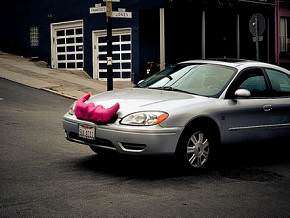[UPDATE: UC Says It Ain't So] University of California System, Ignoring its Own State's Public Utility Commission, Sides with Taxi Cartels Against Convenience, Sense, and Rideshare Apps
[UPDATE: Despite the email linked below via Eugene Volokh saying otherwise, which triggered a series of news reports from the education media, some linked to below, the University of California system today issues a statement that in fact it does and will continue to reimburse for e-hail rides.
As Volokh writes, befuddled, "Why the UC distributed an e-mail to the contrary earlier this week is a mystery to me." And these services can't rest easy—the new statement does say that "We are, however, reviewing and evaluating issues revolving around the safety and security of our employees when they use such services. We are actively seeking ways to overcome potential liability and safety concerns and would like to work proactively with companies such as these to get everyone to a point of complete comfort with the risks involved."]
Original post follows:
As I reported at length last October, California was the first state to create a statewide regulatory structure to allow the use of smartphone apps that summon rides-for-hire; the most prominent such companies are Uber and Lyft.

Despite the fact that the ride services, at least, are in fact fully legal and regulated in California, and amazingly convenient for users, the University of California system has announced that its employees cannot use them for any professionally required rides, at least not on their employers' dime. (The UC system has similarly disallowed reimbursement for using Airbnb for lodging.)
University of California employees will from now on have to hail regular cabs and book standard hotel rooms when traveling on official business, as the system's Office of Risk Services has decided to ban the use of peer-to-peer services such as Airbnb, Lyft and Uber.
Those and other service startups "should not be used because of concerns that these services are not fully regulated and do not protect users to the same extent as a commercially regulated business," according to an email sent out to the University of California at Los Angeles campus. "As the market matures and these businesses evolve, the University may reconsider whether reimbursement of travel costs provided by peer-to-peer or sharing businesses will be allowed."
The decision was made due to "insurance concerns," a spokeswoman for the university system said in an email.
Eugene Volokh, a UCLA professor, reproduced the letter announcing the policy at his blog at the Washington Post.
It is an incalculable—but large, I assure you—number of employee man-hours that will be wasted waiting for cabs in California by this policy. Taxpayers should be concerned.
Editor's Note: As of February 29, 2024, commenting privileges on reason.com posts are limited to Reason Plus subscribers. Past commenters are grandfathered in for a temporary period. Subscribe here to preserve your ability to comment. Your Reason Plus subscription also gives you an ad-free version of reason.com, along with full access to the digital edition and archives of Reason magazine. We request that comments be civil and on-topic. We do not moderate or assume any responsibility for comments, which are owned by the readers who post them. Comments do not represent the views of reason.com or Reason Foundation. We reserve the right to delete any comment and ban commenters for any reason at any time. Comments may only be edited within 5 minutes of posting. Report abuses.
Please to post comments


What do you mean, too many comments?!?!?
And how did my comment end up on this thread?
What do you mean, too many comments?!?!?
And again they bumped me off the P.M. Links onto this thread.
Meh, PM links weren't taking comments for about half an hour.
People should note how the same, usually government-based organizations (public sector unions, teachers unions, state schools, etc) consistently and unfailingly side with things that fuck the public (in this case, with entrenched taxi interests). They don't even try and hide it. We are all there for their convenience, to pick our pockets and lord over us as they see fit. We're the marks and they're the grifters.
It stinks of lawyers, but still, fuck these cunts.
Think of government as Gandalf, and freedom as the Balrog.
"You shall not pass!"
Think of liberty as Gandalf getting pulled into the chasm of statolatry by the whip of government power.
Wow - Cali takes the statist, "fuck you, that's why" road. AGAIN.
Whoda thunk it?
This could be a liability issue. If I'm travelling on official business for my employer and get injured in a car accident, they're responsible for it via workman's comp. If I'm in an "official" cab, they can subrogate that back to the cab company's insurer. If I take Uber, they could get stuck holding the bag.
Don't drivers for Uber have insurance? I'd think Uber would have some sort of requirement for that.
Uber's stance is that they are 1) a foreign company and 2) merely providing an informational service about rides being offered by independent contractors and thus are not responsible for verifying said independent contractors are insured.
A lot of the drivers only have personal auto insurance (which if you've ever read your policy explicitly doesn't cover accidents occurring while the vehicle is being used commercially) and are just not mentioning the fact they're were working as an Uber driver when they file the claims.
test
New Mexico just thumbed its nose at ridesharing.
http://www.kob.com/article/sto.....6tW10BQPNs
... Hobbit
I'm tempted to start up a ride-sharing business called Fuck-U-ber. "What's that? I need your permission to run my business?"
"Fuck U and fuck off."
That'll be our corporate motto.
"should not be used because of concerns that these services are not fully regulated and do not protect users to the same extent as a commercially regulated business,"
Ruled. By. Idiots.
You already knew that, but it bears repeating.